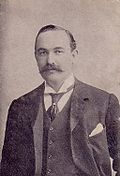Candidates
The Liberal candidate was Sir Godfrey Baring, a 40-year-old Eton educated former Liberal MP from the Isle of Wight. He had sat for the Isle of Wight from 1906 until his defeat in January 1910. At the December 1910 general election he had contested Devonport . He was the chairman of the Isle of Wight County Council.
The Unionist candidate was Charles Sandbach Parker, an Ayrshire-based 47-year-old Chairman and Managing Director of Demerara Co. who had been educated at Eton and Oxford. He had contested Barnstaple at the December 1910 general election.
This page is based on this
Wikipedia article Text is available under the
CC BY-SA 4.0 license; additional terms may apply.
Images, videos and audio are available under their respective licenses.



